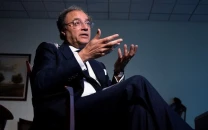War, Iran's denuclearisation and the region
Israel cannot go it along without substantial support from its key allies, the US, UK and France

The war in the Middle East is in its 7th day. Essential aspects were covered in my Tribune Sunday Magazine article titled, "Rising Lion, True Promise: the Israel-Iran shadow war goes hot" on 15 June. As discerned, from eliminating Iran's ability to acquire nuclear weapons; and to 'facilitate' regime change in Tehran, the US-Israel nexus now demands unconditional surrender of the Islamic Republic. Israel reckons nuclear weapons in the hand of clerics would continue to pose it an 'existential threat', therefore removal of both is an imperative.
IDF's current targeting strategy of killing almost the entire Irani military, leadership and important political, religious leaders and scientists; its wide-ranging attacks on infrastructure; its operations against Irani military facilities, in addition to nuclear installations at Natanz, Fordow, Bushehr, IR-40 (Arak) and elsewhere are aimed at achieving these dual objectives. Tel Aviv reckons Irani regime stands on shaky grounds due to prolonged sanctions, poor economic performance, political unrest and degradation of its regional clout and proxy potential. Hence persistent operations 'would' lead to the regime change but before that nuclear potential has to be taken out.
For this, Israel had been 'shaping the environment' for years through military and diplomatic coercion, assassinations, cyber-attacks and degradation of Iran's 3H (Hamas, Hezbollah and Houthi) proxies through relentless overt and covert military, cyber and sabotage operations. Mossad has deep ingress at sensitive levels of the Irani state and society as substantiated by the recent assassinations of Irani scientists and military, religo-political leaders, not deemed possible without 'Humint' or human intelligence.
However, Israel cannot go it along without substantial support from its key allies, the US, UK and France. Militarily, to take on the deeply burrowed Fordow fuel enrichment plant for example, IDF lacks bunker-busting munitions like the GBU-43/B, GBU-57 and the transporting bombers. It is also dependent upon its limited number of KC-707 air-to-air refuelers, to enable IAF's F-15L, F-16 and F-35 fighter jets to target Iran, during some 3,000 km of roundtrip. The US may join the war to compensate for Israeli shortfalls and has been repositioning its military, air as well as naval assets in the theatre. From messaging to posturing to shooting war, parties have room for diplomacy under coercion.
Netanyahu from Day One was desperate to suck the US into this war. That outcome might leave Iran badly bruised but determined and hostile; Tehran's nuclear programme retarded, not eliminated but capped; and power within Iran re-arranged. The US is letting Israel weaken Iran sufficiently so that it is ready to sign a nuclear deal on unfavorable terms, which could be capping and rolling back the nuclear programme, short of an attack by the US forces. Such a deal might irreparably weaken the clerics, laying grounds for a regime change. Israel's deal, imposed on Hezbollah after recent military degradation, forcing Hezbollah to stay neutral in this war, can be a US-Israeli blueprint.
However, the US participation in a shooting war has implications. First, declaration of war by any US president without consulting the Congress is unconstitutional, but US presidents have been doing so after World War II. So, domestic legal challenges can be circumvented. Second, any further degradation of nuclear facilities after the US involvement may cause dangerous radiation leaks and set wrong precedence; as the US, a responsible power would be attacking nuclear installations, legally forbidden even in war. Third, the US involvement may expose around 50,000 US troops on 19 bases in the Middle East to Irani and proxy retaliatory attacks. Although Tehran has been careful in its targeting strategy so far, desperation leads to errors and blunders. Fourth, conflagration would upend regional stability as Iran borders some six countries including Pakistan and Iraq, and has some 14 maritime neighbours. Regime change, domestic instability would have religious and sectarian repercussions especially in Iraq, that still bases US troops on sprawling Victory (Al Asad), Habbaniyah and Marez camps, etc. Iraq is Iran's known ally.
Although the Jewish influence on the American policy is no hidden secret, and although Netanyahu sees everything through a dangerous and hate-filled binary, the world Jewry should be more careful in reigning Netanyahu, rather than allowing the US to get involved in a deeply unpopular war. World Jewry needs to be sensitive to the damage Netanyahu has already caused to their cause, and sense the international rage directed at Zionism and Jews for their genocidal war under America's criminal complicity in Gaza. So, by rational standards, the US should, instead of getting involved, push seriously to halt hostilities and work for a deal.
However, as Netanyahu is apparently under nobody's control; Trump is unpredictably mercurial; ceasefire is making no apparent headway; and Israel is sustaining damage, however limited, so the conflict might escalate in the short term with or without the direct US involvement. The recent US pronouncements of Iran's unconditional surrender and killing Khamenei etc are part of posturing strategy aimed at bringing Iran to the negotiating table without getting involved in a shooting war.
Iran is likely to fight back using its missile arsenal, the largest in the region. Continued military degradation would, however, reduce its lethality and effectiveness. With the present rate of around 11% missiles, especially in the Hypersonic category (Khyber Shikan for example) getting through the four-tiered Israeli AD system, the much smaller Israeli population would be subjected to fear, psychological trauma, shelter psychosis and insecurity. Iran may also usher in crisis in the oil markets by shutting down the Strait of Hormuz, the narrow waterway allowing 20% of global oil flows.
What does it hold for Pakistan? Netanyahu's dislike for Pakistani nukes wed to an 'extremist ideology', as he mentioned in an interview, is no secret. And his influence over the US Administration, where he is considered 'running the US foreign policy' is also known. So, for Pakistan, investing in drone technology (usage and counter), missile regimes especially in hypersonic category with multiple and manoeuvrable warheads, asset hardening, AD and PAF are critical now, like never before. Army also needs a new look as Indian threat under Modi, with or without Israel, would be a lurking reality. Naval forces should be able to destructively shred any Indian naval blockade.















COMMENTS
Comments are moderated and generally will be posted if they are on-topic and not abusive.
For more information, please see our Comments FAQ